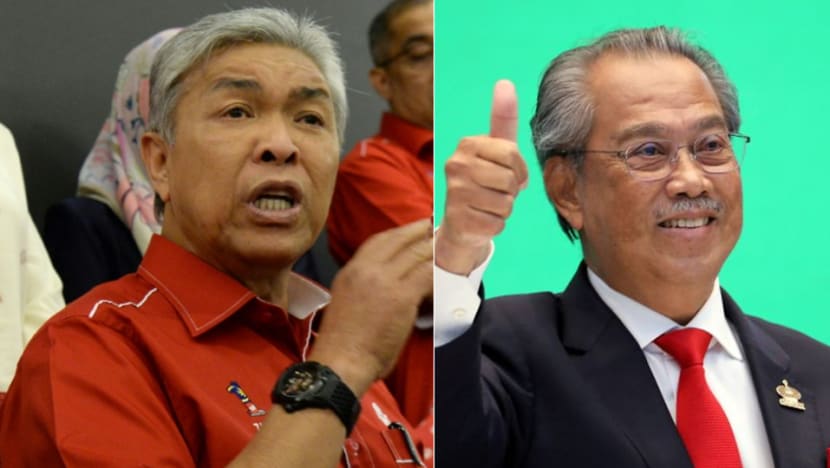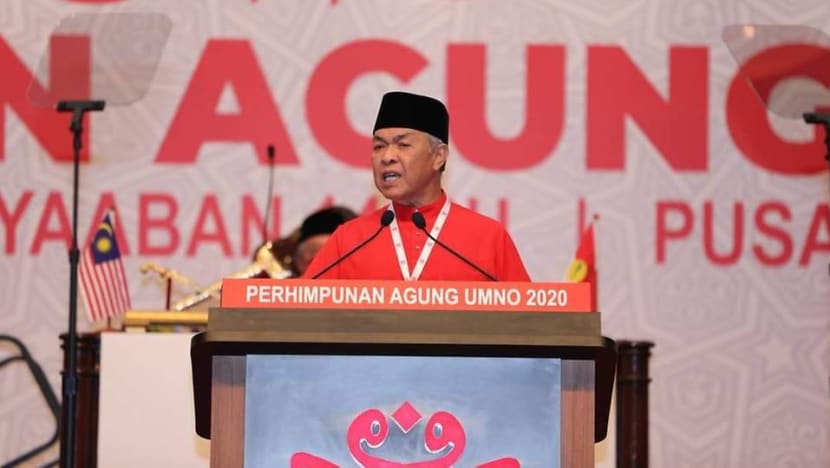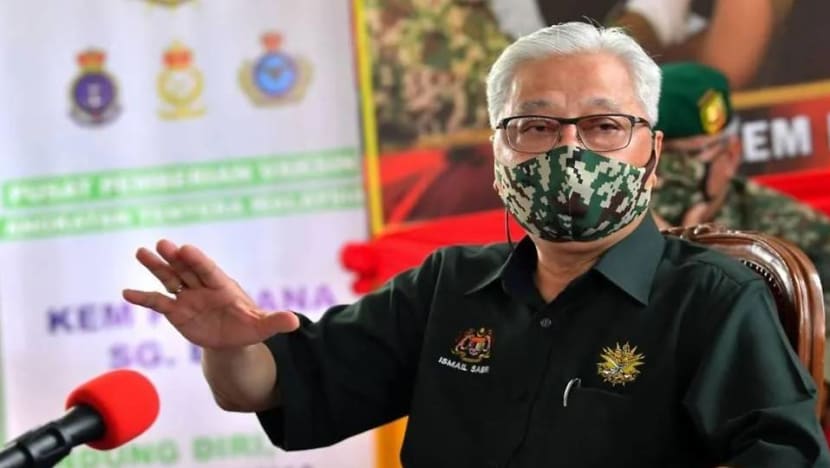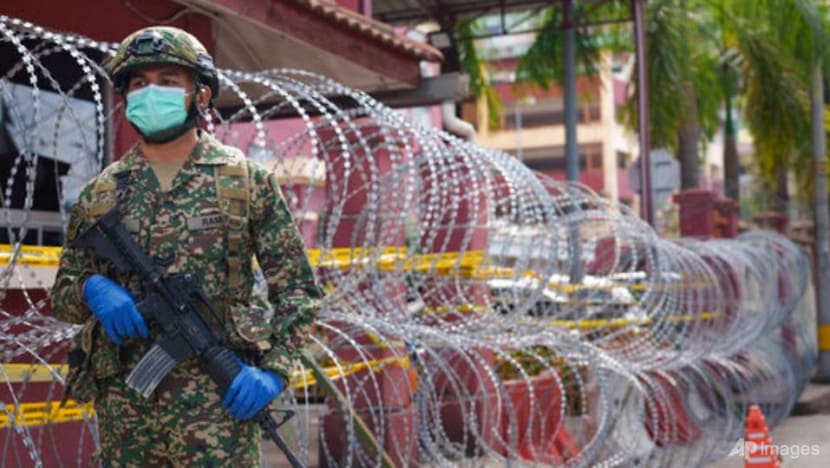Commentary: UMNO’s withdrawal of support shows Malaysia’s political establishment is losing the plot
Malaysians may remember this tussle between UMNO and Bersatu as one where the political establishment lost its ability to put the country above political, even personal interests, says James Chin.

Composite pictures of Zahid Hamidi and Muyhiddin Yassin. (Photos: Agencies)
HOBART: At 1am on Thursday (Jul 8), UMNO president Ahmad Zahid Hamidi gave a press conference in which he confidently announced that UMNO was withdrawing from the Perikatan Nasional (PN) government and called on Muhyiddin Yassin to resign. He also urged for an interim government to be formed to see out the pandemic.
The press conference came right after other fresh developments that day. On Wednesday afternoon, Muhyiddin suddenly announced that Defence Minister Ismail Sabri will be appointed Deputy Prime Minister and Foreign Affairs Minister Hishammuddin Hussein appointed Senior Minister.
The announcement unequivocally established UMNO as the second most powerful party in government.
Yet, this was apparently done suddenly, without any notification to the UMNO leadership according to UMNO Supreme Council member Ahmad Puad in a later interview with Free Malaysia Today.
Puad was speaking to journalists just before the UMNO Supreme Council met that evening leading up to Zahid’s press conference. According to Puad, many members had thought the promotions were a disingenuous move on Muhyiddin’s part to sway UMNO from defecting or even drive a wedge between the party members.
READ: Commentary: Even if PM Muhyiddin steps down, few good options for Malaysia’s top role
WAS THERE A SPLIT WITHIN UMNO?
In Zahid’s announcement, he framed UMNO’s decision to leave the PN government in terms of Bersatu’s failure to meet key UMNO demands for the government to control the pandemic, arrest the economic downturn and bear in mind people’s aspirations. Bersatu has rejected these allegations.
He also highlighted how people have already signalled that the PN government is a failure and expect a new government.
As expected, the newly appointed DPM and Defence Minister Ismail Sabri took the opposite position, arguing that this was not the right time to pull down a government with COVID-19 raging in Malaysia.
Although no vote was taken, Zahid probably won the argument because of the structure of the UMNO Supreme Council which comprises 46 members. Only three council members – Ismail Sabri, Minister for Higher Education Noraini Ahmad and Youth and Sports Minister Reezal Merican - hold positions in the Muhyiddin administration. Only 15 council members are MPs.
In other words, current ministers who have a vested interest in keeping UMNO in this government, such as Hishammuddin, Khairy Jamaluddin, Annuar Musa, Adham Baba and Halimah Sadique who are not members of the Supreme Council, cannot take part in the discussion.

Zahid’s strongest argument is that UMNO should take over the prime ministership now, rather than wait for the general election.
This position is popular among UMNO grassroots who want to see Bersatu destroyed as they fear Bersatu could potentially cause the demise of UMNO.
The longer the PN governments stays in power, the argument goes, the stronger Bersatu becomes. This is factual given that Bersatu is setting up branches all over the rural areas such as those in Perak where UMNO is strong.
READ: UMNO urges Malaysian government to reconvene parliament within 14 days; failure to do so considered 'treason'
READ: PM Muhyiddin and Cabinet can still exercise executive powers despite UMNO's withdrawal: Attorney-General
DID ZAHID OVERPLAY HIS HAND?
During the press conference, Zahid made it clear he expects all UMNO members serving in government to resign, thus causing the collapse of the government. But this is easier said than done.
In theory there is nothing Zahid can do to enforce this. Cabinet and key government positions are appointed directly by the PM. Thus, even if he sacks the recalcitrant UMNO ministers from the party, they can still serve in Cabinet.
Even worse, if UMNO sacks them, there is every reason for these lawmakers to simply join Bersatu, thus strengthening the latter’s hand.
The only way Zahid can enforce UMNO’s exit from government is if he can convince UMNO members he can put together a coalition to replace PN. The unspoken target of course is to return UMNO to the seat of power in the office of the prime minister.
READ: Commentary: UMNO's break with Bersatu could come at a high price for Malaysia
READ: Malaysian parliament to meet from Jul 26 to pave the way for hybrid sitting, says prime minister's office
If he can do this, even his current detractors cannot stand in his way. After more than a year of shifting political loyalties and switches of allegiances of UMNO members to Bersatu, we should not underestimate how swift such change can come.
Even then, loyalty sometimes favour party lines when personal ambition lines up with circumstances. For example, there is no reason why Ismail Sabri should stay loyal to Muhyiddin if Zahid can offer him the post of interim prime minister if UMNO takes over.

What will happen immediately now is both sides will be reaching out to try to secure support for either the government or the opposition. Both sides are looking for a simple majority to stake their claim on government while careful to avoid being seen openly to be working with the Pakatan Harapan or Democratic Action Party specifically.
But the reality is that the winning side will need some MPs from the opposition PH if they want a majority.
Malaysian MPs are now the hottest commodity in the Malaysian political market and we should expect some horse-trading behind the scenes.
READ: Commentary: Political infighting hampers Malaysia’s COVID-19 response
On the other side, Muhyiddin has shown he is willing to pay any price to stay in power, even reaching across the aisle with the elevation of two top UNMO ministers to DPM and Senior Minister.
One must understand that if Muhyiddin falls, there is a possibility that the entire future of Bersatu will fall on the wayside as well, since they no longer control the office of the prime minister and all the patronage flows from that office.
Muhyiddin still has one card to play to make peace with UMNO. His government can intervene quietly in the corruption trials and save the political career of Zahid, Najib and the few implicated in similar scandals.
READ: Commentary: Malaysia PM Muhyiddin’s hand could be forced as pressure mounts for COVID-19 accountability
This will be unacceptable for the Malaysian public but cannot be ruled out at this tense moment. If this option is exercised by Muhyiddin, it will be done quietly and UMNO will simply give a reason for their U-turn, something that is increasingly normal in Malaysian politics. A cynical Malaysian public will be outraged but not surprised.
Another easy option for Muhyiddin to come to an understanding with UNMO leaders is for him to resign, but appoint a replacement from Bersatu. Since he is the lighting rod for all of UMNO’s criticism, if he steps down, UMNO will get the “interim” government it seeks.
RETURN OF THE KING?
In the final analysis, all the options are on the table and it would be foolish to second-guess what will happen in the next few weeks.
The only option out of this political impasse is a general election to seek a mandate from the people. But an election when COVID-19 numbers are still going up in Malaysia seems reckless.
There are increasing calls for the king to intervene. One must remember it was the Agong who “picked” Muhyiddin to be PM in February last year after Mahathir Mohamad’s sudden resignation created a vacuum and an impasse, and the king asked all MPs to meet him.

Will the same thing happen this time? I suspect the Agong will wait and not move swiftly like he did in February 2020. The situation on the ground is different now, complicated by the COVID-19 situation.
It is a pity more political attention and efforts aren’t focused on beefing up the country’s fight with the pandemic and rescuing the ailing economy. Instead, political leaders appear to be pursuing their personal agenda of power and bringing down the government.
While history might blame COVID-19 as the precursor for the current political crisis, most Malaysians living through this horrid reality may recall this period as one where a pandemic brought into sharper focus how the ruling Malay political establishment lost its plot and ability to put the country before personal interest.
That is the true Malaysian COVID-19 tragedy.
(Listen to Malaysians in Sabah, Johor and Kuala Lumpur share how they have been coping fighting a new wave of COVID-19 infections in Heart of the Matter podcast.)
Professor James Chin is Professor of Asian Studies at the University of Tasmania and Senior Fellow at the Jeffrey Cheah Institute on Southeast Asia.














